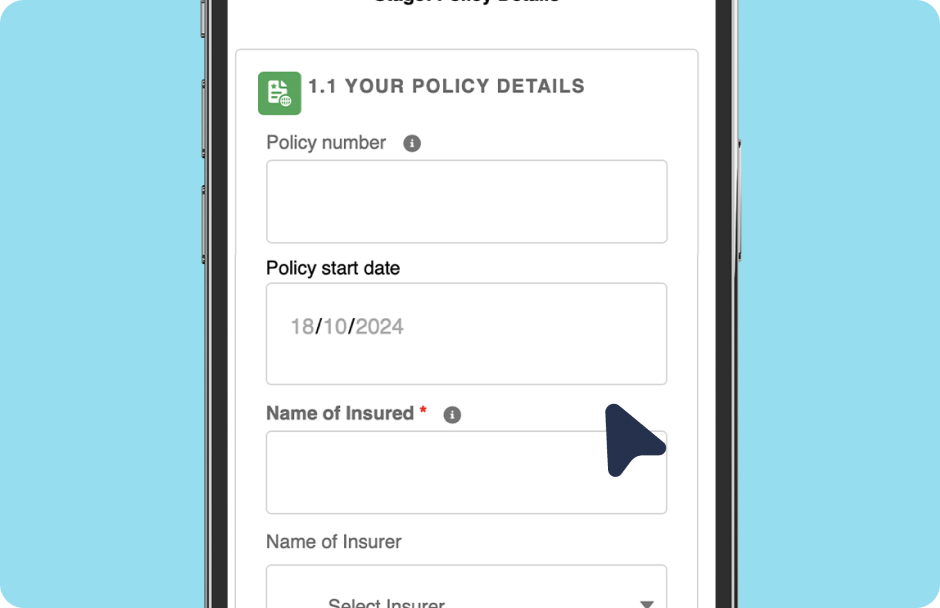Compare quotes from our trusted insurance partners:
On this page:
What is tradie insurance?
Tradie insurance is business cover tailored to help protect you and your business against common risks that tradespeople face on the job. It helps cover the cost of claims, such as third-party injuries, accidental property damage, and stolen tools.
Whether you’re a sole trader or run a construction business with multiple employees, we can help you get personalised insurance solutions to help protect you against financial losses.
BizCover offers different levels of cover to suit the needs of self-employed tradies and small business owners, from electricians and plumbers to handymen, carpenters, and more.

Why do tradespeople need insurance?
Tradies face many day-to-day risks on the job—and sometimes after it’s completed. Activities such as completing complex projects, managing employees, or hiring subcontractors can create risk for tradies.
Even a simple accident or innocent mistake could lead to an expensive lawsuit. Business insurance can be a safety net that helps protect you and your livelihood if things go wrong.
For some tradies, Public Liability is a legal requirement to obtain a trades license in Australia. It may also be contractually required to take a job or enter a worksite.
Enter a jobsite.
Lease a workshop.
Become licensed.
Work as a contractor or sub-contractor.
Pay legal costs if you face a liability claim.
We cover over 800 tradie occupations
Find tailored insurance options for your trade.
Types of trades we cover
We cover over 800 different trade occupations, from electricians and carpenters to plumbers and bricklayers. With BizCover, you can customise your insurance policies to meet your business needs.
Don’t see your trade listed below? Don’t worry! We cover most trades businesses. Start a quote to find your occupation.
What does tradie insurance cover?
We offer a range of policies designed to cover your business, tools, and stock. Build an insurance package that suits your needs and buy in minutes.
Essential cover
Additional cover options
How much does tradie insurance cost?
On average, business insurance for tradies costs $98 per month with BizCover*. However, the cost of your policies will depend on different factors, such as the services you provide and the size of your business.
How is the cost of insurance calculated?

Factors influencing cost
Risks of the industry
Cover level amount
Annual turnover
Number of employees
Claims history
*Customer Average Monthly Payment Report is based on 1 July 2024 to 30 June 2025 and presented as a guide only. It may not reflect pricing for your particular business, as individual criteria will apply.
Get cover that works for your trade
With BizCover, you can choose different cover levels to suit your business needs, including Public Liability limits up to $20 million.
Unsure how much to choose? Think about:
Underinsurance
We know it’s tempting to select a lower level of cover to reduce premiums, but this can leave businesses shocked and insufficiently covered when making a claim.
Ways underinsurance catches business owners out:
Inflation
With inflation, the cost of living and doing business increases. Remember to over yourself, your tools and assets for the rising costs of replacing or covering them, not what you paid for them – you may be surprised at the difference.
Not covering the full cost of your risks
If you select cover levels for less than the value you may be found liable – left out of pocket when it comes to claims time. It’s important to review your risks and determine how much you will need to cover any claim that may come your way.

Factors influencing cost
Risk of the industry
Cover level amount
Annual turnover
Number of employees
Claims history
*Customer Average Monthly Payment Report is based on 1 July 2023 to 30 June 2024 and presented as a guide only. It may not reflect pricing for your particular business, as individual criteria will apply.
Get cover that works with the risks of your business
With BizCover, you can choose different cover levels to suit your business needs, including Public Liability limits up to $20 million.
Unsure how much to choose? Think about:
Statutory professional requirements
Cover required by contracts
Number of employees being covered
Your contract value
Worst case scenario claim size
Underinsurance
We know it’s tempting to select a lower level of cover to reduce premiums, but this can leave businesses shocked and insufficiently covered when making a claim.
Ways underinsurance catches business owners out:
Inflation
With inflation, the cost of living and doing business increases. Remember to over yourself, your tools and assets for the rising costs of replacing or covering them, not what you paid for them – you may be surprised at the difference.
Not covering the full cost of your risks
If you select cover levels for less than the value you may be found liable – left out of pocket when it comes to claims time. It’s important to review your risks and determine how much you will need to cover any claim that may come your way.
How It Works – Buying Online
5 easy steps to get instant cover online today

Select Profession
Pick Your Covers
Add Business Details
Compare Quotes
Get Covered Online
How To Make a Claim Online
We’ll assist you through the claims process & manage the claim directly with the insurer.

Let us know Fill out our
claims form and provide info
to support the claim
Receive extra support We
will assist you with your claim
Claim results We will notify
you of the claim outcome.



Award-Winning Tech & People
We’re not ones to blow our own trumpet, but we are pretty proud of our innovative insurance platform, outstanding team, and stellar workplace.
See How Much Others Have Saved By Purchasing a Policy Through BizCover
^ Savings made from January 2024 to April 2025. This information is provided as a guide only and may not reflect pricing for your particular business, as individual underwriting criteria will apply.
Frequently asked questions
Some types of insurance may be compulsory for tradies to become licensed, work, or meet the terms of a contract.
For example, Public Liability insurance is usually required for tradespeople, sole traders, and subcontractors to enter worksites. A policy may also be required to lease commercial space for your business (such as an office, workshop, or warehouse). Public Liability insurance is also required to receive and maintain an electrical contractor license in most states and territories. Plumbers in Tasmania and Victoria must have a Public Liability policy to become licensed.
Professional Indemnity insurance is required for certain types of building practitioners in Northern Territory, Queensland, Victoria, and Western Australia. Starting in July 2026, it will also be mandatory for registered building practitioners in New South Wales. Always check the laws and regulations in your state or territory to understand your insurance obligations.
Personal Accident & Illness is not mandatory for tradies, but it can provide important protections for you and your business.
Sole traders and subcontractors are typically not covered by workers’ comp schemes. If you are injured or fall seriously ill, you may miss out on weeks or months of income while you recover. A Personal Accident & Illness policy may provide a weekly income benefit or lump sum payment to cover lost income, permanent disability, or accidental death (subject to policy wording and limits).
Sole trader and self-employed tradies may need Public Liability insurance to receive a trades license, work as a contractor or subcontractor, or enter job sites.
Even if a Public Liability policy is not required for your work, it can still help protect your business. Public Liability insurance could help you manage the cost of third-party injury and property damage claims. These are some of the most common claims that small businesses face and can be expensive to pay out of pocket.
Every tradie business is unique. BizCover offers Public Liability cover levels of $5 million, $10 million, $15 million, and $20 million (cover amounts may vary by occupation).
When choosing your cover amounts, you may want to consider:
- The size of the jobs that you are working on – The higher the value, the higher risk. You may want to increase your Public Liability insurance accordingly.
- Your business contracts – Is there a minimum amount of cover stipulated in your contract? Meeting contractual obligations is essential.
Some tradespeople may be required to have Professional Indemnity insurance to work in some states and territories. For example, plumbers in Victoria must have minimum levels of Professional Indemnity cover to become licensed. Professional Indemnity insurance is also a common requirement for different types of building practitioners.
Always check with your state or territory licensing body to understand the insurance requirements for your trade and location.
The cost of your Public Liability insurance may be tax deductible in Australia. The ATO allows sole traders and small businesses to deduct some operating costs when they file their taxes. An accountant or tax professional can help you understand which expenses may be deductible for your business.
BizCover can help tradespeople cover different work activities. We make it easy for a ‘jack of all trades’ to protect themselves from common business risks.
















Real-life customer reviews verified by Feefo